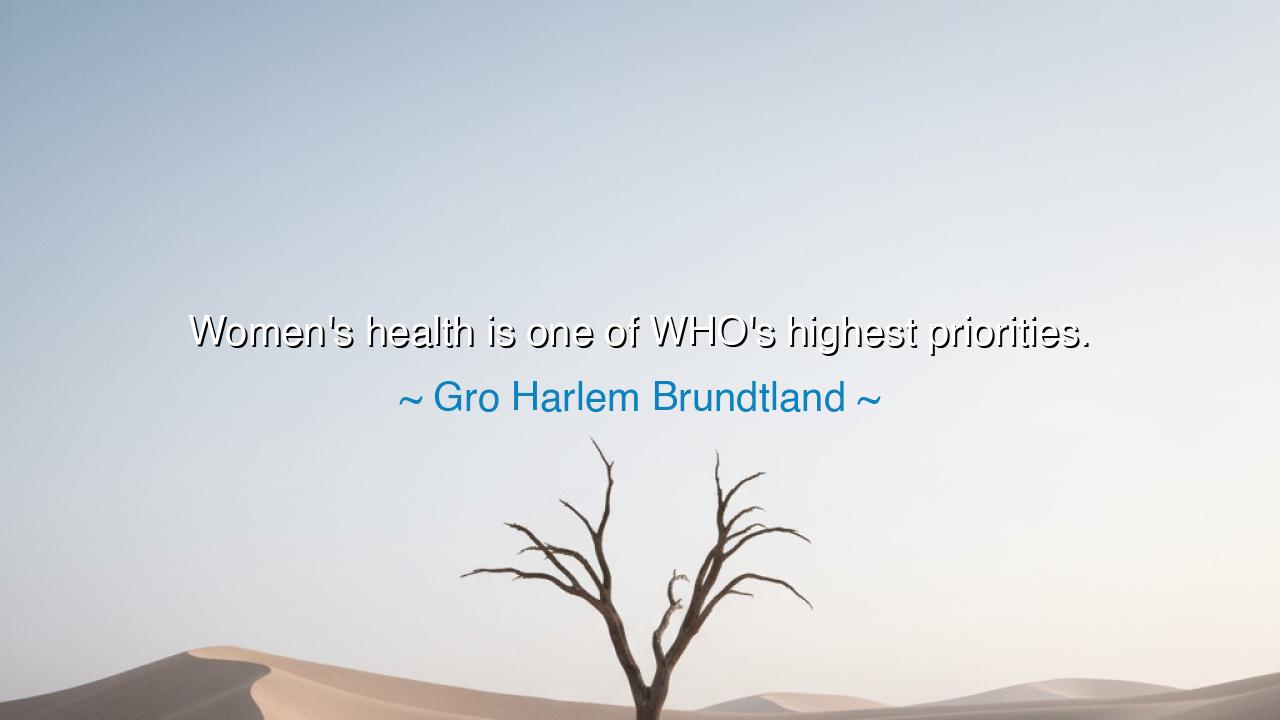
Women's health is one of WHO's highest priorities.






The Call of the Healer
Hear the words of Gro Harlem Brundtland, physician, leader, and former Director-General of the World Health Organization, who declared: *“Women’s health is one of *WHO’s highest priorities.” Though simple in sound, these words are heavy with the weight of centuries, for they speak not only of medicine, but of justice, dignity, and the sacred balance of humanity itself. To care for the health of women is to care for the roots of the world, for it is through woman that life enters the earth, and through her strength that families, nations, and generations endure.
The Meaning of the Teaching
When Brundtland speaks of women’s health as a “highest priority,” she does not speak only of the body, but of the wholeness of being—of the mind, the heart, and the spirit. For the health of a woman is not a single flame, but a constellation that lights the path of every society. Where women suffer in silence, there can be no prosperity; where women are denied care, there can be no peace. To heal women is to heal the future, for they are the first teachers, the quiet pillars, and the bearers of life’s sacred rhythm. Thus, Brundtland’s words are not policy—they are prophecy.
The Origin of the Words
Gro Harlem Brundtland, born in Norway and trained as a physician, rose to prominence not only as a healer of individuals but as a healer of nations. As the first woman to serve as Prime Minister of Norway, and later as the head of the World Health Organization, she brought to her leadership the wisdom of both science and compassion. Her declaration arose from years of witnessing inequality—how women across the world bore the burdens of childbirth, disease, and poverty without access to the care they deserved. She knew that a civilization’s greatness is not measured by its wealth, but by how it protects its most vulnerable. Thus she proclaimed: “Women’s health is not optional; it is essential.”
The Story of the Forgotten Mothers
There is a story from the villages of sub-Saharan Africa, where women once walked miles to fetch water, even when carrying life within them. Many fell ill, some never returned. The world ignored them—until the WHO began its mission to bring maternal health programs to those forgotten places. Clinics were built, midwives were trained, and the lives of mothers and children were saved. The women who once carried suffering now carried hope. This is the living embodiment of Brundtland’s words: that when women are healed, the earth itself breathes again.
The Strength of the Nurturer
In every culture, women have stood as the quiet healers—the hands that tend the sick, the hearts that hold families together. Yet for too long, their own health was overlooked, their needs deemed secondary. Brundtland’s message reminds the world that the nurturer too must be nurtured, for the vessel that gives life must not be allowed to break. When women are strong, communities thrive. When they are neglected, even the mightiest societies wither. The health of women, therefore, is not a woman’s issue—it is the foundation of civilization itself.
The Ancient Parallel
Even the ancients understood this truth. In the temples of Isis in Egypt, in the healing sanctuaries of Hygeia in Greece, and in the sacred circles of the midwives, women’s care was revered as divine work. The goddess of health was often depicted as feminine, for creation and preservation were seen as one. Brundtland’s words, though born of modern science, carry this same ancient spirit: that to honor women’s health is to honor the sacred continuity of life itself. The physician and the philosopher meet in this wisdom—the body of the woman is the cradle of humanity; to care for it is to protect the future of the world.
The Lesson for the Generations
Therefore, O listener, take heed of this truth: the well-being of women is the well-being of all. Let no community, no government, no heart forget this. Support healthcare that uplifts women—maternal care, education, mental health, access to medicine, and the freedom of choice in their own bodies. Encourage the young to see health not as privilege, but as right. For when a woman stands in strength, she carries her children, her family, her nation with her.
The Eternal Counsel
So let the words of Gro Harlem Brundtland ring through the ages: “Women’s health is one of WHO’s highest priorities.” These are not words of bureaucracy—they are a call to humanity. Let them remind us that compassion is the truest measure of progress, and that no society can call itself whole while half of its heart suffers. Protect the mothers, the daughters, the sisters, the healers, and the dreamers. For in honoring their health, we honor the very source of life—and the world itself shall prosper in harmony and light.






AAdministratorAdministrator
Welcome, honored guests. Please leave a comment, we will respond soon